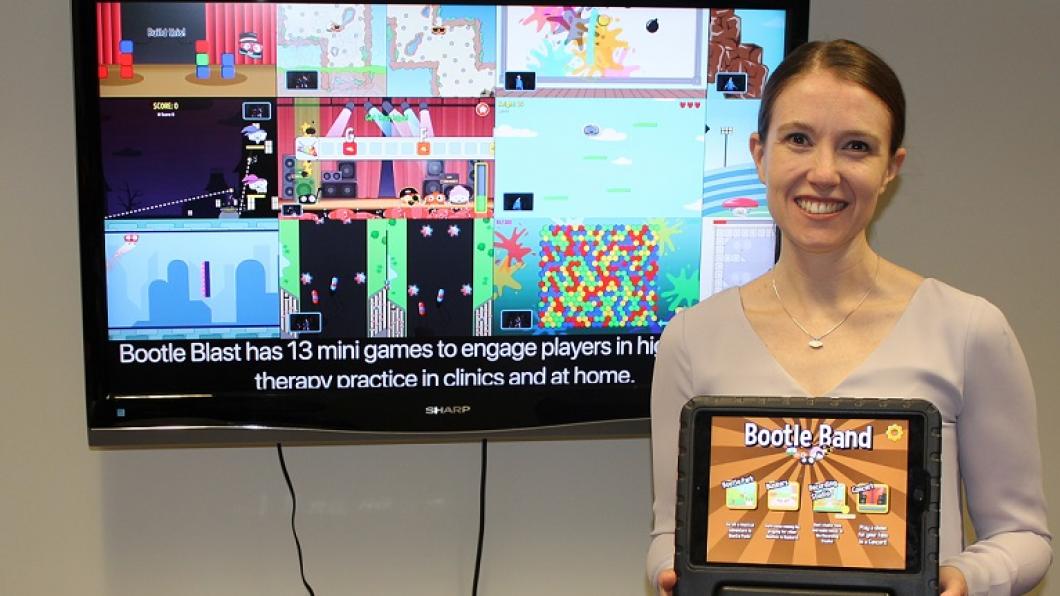
Kids with disabilities will have a new, fun way to do therapy at home with the help of an innovative video game co-designed by researchers, families, clinicians and gamers: study
Convincing a child to do their therapy exercises can be a tough task for any parent or caregiver. Motivating them to repeat the same move over and over again can be even harder.
This is where Botley’s Bootle Blast comes in.
Thanks to a CIHR commercialization grant, Dr. Elaine Biddiss and her research team at the PEARL Lab (Possibility Engineering and Research Lab) will bring the therapy-based virtual video game to the homes of children and youth across Canada where they can mix fun and therapy together in a new pilot study.
“The movements that the child has to master in therapy are inherently difficult,” says scientist Dr. Biddiss, who heads up the lab and is the co-principal investigator of the study along with Sharon Wong, director of commercialization. “This mixed-reality video game offers children an engaging way to do their therapy as well as making it a fun activity for the child’s family and friends to share in.”
Made-in-Holland-Bloorview Innovation
Co-designed by Dr. Biddiss and her team in close collaboration with families, clinicians and game developers, the video game involves kids trying to capture little robots – named Bootles – who are running amok in a virtual world called Sky Spark City. Botley, a robot who lives in this fictitious world, created the miniature Bootles to help him with his countless chores but ended up creating too many with his replicating machine.
The game is unique: it can be personalized to meet each child’s abilities and their therapy goal. It is also purposely designed to be very elaborate so kids can play for longer periods – and work on improving specific motor functions in their arms and hands.
Since 2017, clinicians at Holland Bloorview have been using the video game successfully to help children primarily with cerebral palsy at Holland Bloorview. But more recently, the game has been used with kids who have other conditions such as spinal cord injury and acquired brain injury at Holland Bloorview.
Botley’s Bootle Blast goes into the field
Now the research team, led by Dr. Biddiss, will be test-piloting the game on 60 children from ages seven to 17 with diverse disabilities in homes both in urban and rural settings across the country starting later this year.
The goal? To find out if the families see any value in the game in meeting their needs, whether it is to encourage their child to meet a specific therapy goal, or to have their child use the game to play alongside their siblings. The research team also wanted to determine how easy the game is to set up as a “plug-and-play” gaming system.
In the pilot study, each family will be given 15 weeks to play with Bootle Blast after an initial video conference to observe set-up and configuration of the game. At the end of the study, they will provide feedback to the researchers on whether or not they felt the game had any impact, and if so, how.
In addition, the game, which previously used Microsoft Kinect and a separate computer system to run, will now use a less expensive 3D sensor that has a computer built into it. This box-like device can be simply connected to a television so the child can play the game.
Future plans
Looking to the future, Dr. Biddiss hopes to field test the game on children with ASD and those with developmental coordination disorders – a condition that affects one in 16 children.
There are also plans underway to commercialize the game, so that it can be made more widely available to families as well as health-care providers.
“I am thrilled that Dr. Elaine Biddiss and Sharon Wong have been awarded this commercialization grant. Along with families, clinicians and game developers, the team co-designed this innovative therapy tool for children with disabilities,” says Tom Chau, vice-president of research and director of the Bloorview Research Institute. “This grant will measurably advance efforts to bring this technology to those who can benefit from it the most.”
Related Stories
Holland Bloorview demonstrates Botley’s Bootle Blast at CAHO’s Queen’s Park Showcase
BRI features six innovations at Accessibility Innovation Showcase